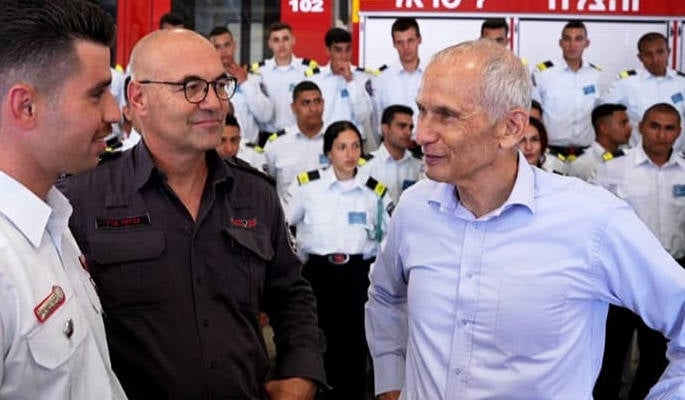“Their integration is a WIN-WIN for both the individual [Arab] and the society,” said Minister of Internal Security Omer Bar-Lev.
By Gil Tanenbaum, TPS
On Tuesday a ceremony was held at the National Fire Brigade in Rishon Lezion in honor of 31 members of the national service from Israel’s Arab community who completed the course to become assistant firefighters.
The course graduates will begin their service in the fire brigade at various fire stations throughout the country.
Minister of Internal Security Omer Bar-Lev, Fire and Rescue Commissioner Eyal Caspi and the director of national service at the National Security Authority Oren Nehemiah were all in attendance.
This was the fourth such course. In addition, at the end of May, for the first time, five service members from Arab society completed all the stages of permanent recruitment. The integration of Arab-Israelis into the permanent service was described as a breakthrough in the integration of Israel’s Arab communities into Israeli society as a whole.
In Israel, formal national service has been offered to citizens as an alternative to compulsory military service. This option was generally offered to religious women who cannot serve in the IDF for religious reasons. But in recent years the option has expanded to many other sectors of Israeli society, such as ultra-orthodox men who object to serving in the military for various reasons, those not wanted by the IDF for health reasons and so forth, and, of course, Israeli-Arabs.
Such service can be performed in any number of ways. In addition to emergency services like firefighters and medics, people also serve in education, assisting the elderly or infirmed and in many other areas of Israeli society in need of help.
Many who go through extensive training for their service, like firefighters, choose to make a career in that area. The more that Arab-Israelis perform such functions the more Arab society can be fully integrated into Israel’s society as a whole. This, in turn, can help bring about more peaceful co-existence among Israel’s many and diverse populations.
Israel’s Minister of Internal Security Omer Barlev, whose ministry is responsible for Israel’s emergency services, expressed that very sentiment.
“Integrating service members from Arab society into security bodies is internal security!” he said. “Their integration is a WIN-WIN for both the individual [Arab] and the society. I think that this is why each and every one of those young people has decided to join national service and spend a year of his life.”
Barlev told the graduates that this means that they are all leaders in their own right. Acknowledging the social pressures in their communities that make it hard for Arabs to undergo national service, he added that these people are leaders because each one “took responsibility for himself and sometimes even ignored the environment and decided what is right for him to do in particular that it serves his environment and all Israeli citizens.”
